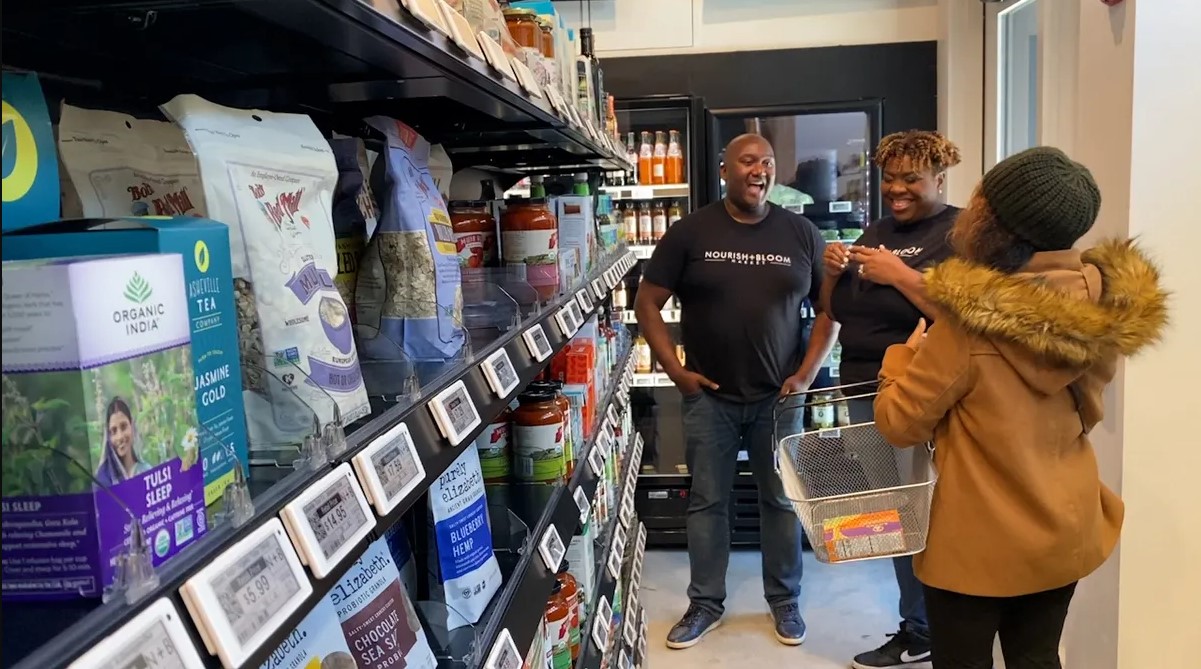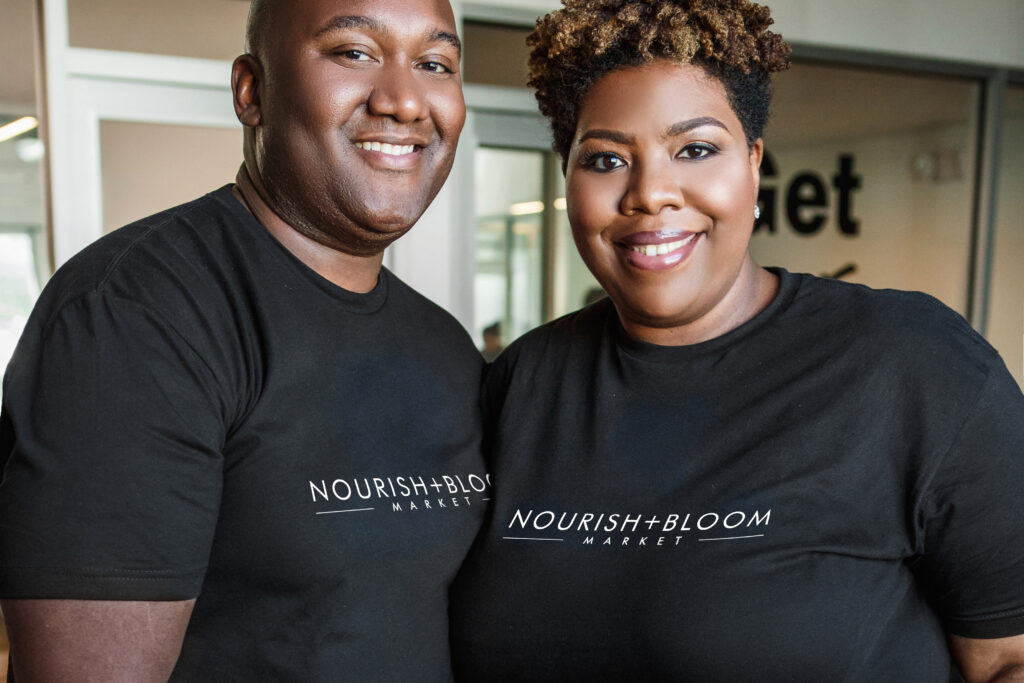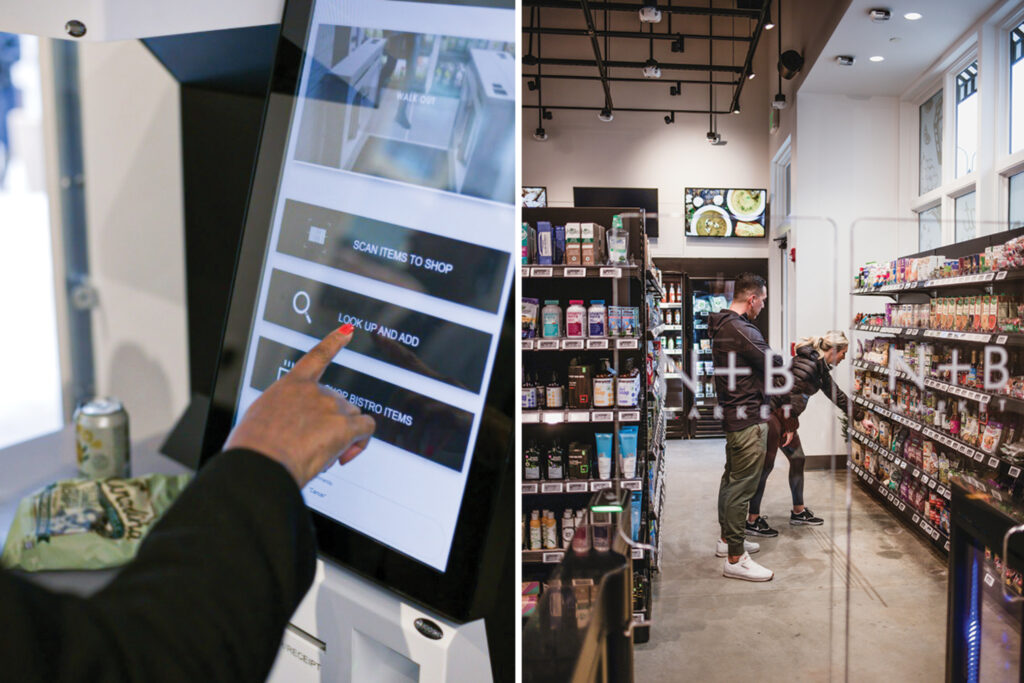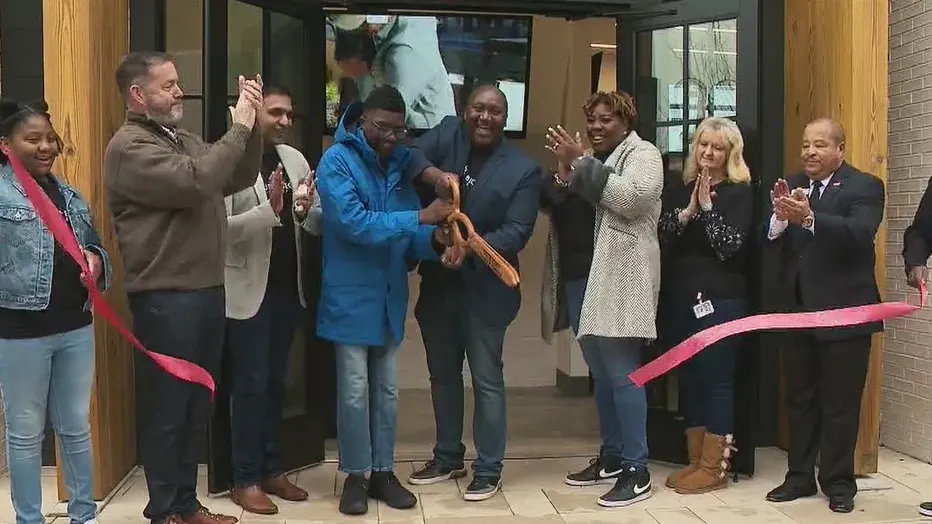
Autonomous market Nourish + Bloom relies on technology to nurture convenience and community
Growing up in New York City, Jilea Hemmings could always count on her local bodega to supply her family’s meals and fulfill last-minute ingredient requests. It’s also where she could count on a great sandwich and catch up with neighborhood regulars. So when she envisioned creating a new kind of grocery store, she came back to her childhood memories of the corner stores found throughout the boroughs.
“It really was a staple for the community,” says Hemmings, who co-founded the Nourish + Bloom Market in Fayetteville, just outside Atlanta, with her husband Jamie, in January 2022.
In their iteration of the bodega, they’re elevating the experience to appeal to residents of suburban mixed-use communities who value resources they can walk to. “Food is something that no matter what, you’re going to need. But to get somebody off their couch to come into your establishment, it’s going to have to be more than the mundane shopping experience,” Jilea says.
They’ve delivered to customers’ homes – with robots, no less – but they also wanted to create a safe and inviting place for their community to browse, pay and leave without any obstacles. They saw the future in experiential retail.
“I think now more than ever, the reason behind what we’ve done makes sense. Because if you go shopping now, you’re waiting in line for longer than you were actually in the store to get what you went there for in the first place, and so it’s extremely frustrating,” Jilea says.
“But at our store, I can just scan through a turnstile at the entrance, shop like I normally would and then walk out with the receipt and don’t have to wait in line. How great is it that now you have 24-hour access to get your needs met in a cool way that respects your time?”
The Hemmings choose local sources first, such as a hydroponic garden that is 10 minutes from their store. Local brands also get a lot of love, as well as the Hemmings’ own Greenie Tots, which they created when they prioritized healthy eating as part of a lifestyle change in treating their eldest son’s autism diagnosis 10 years ago. More than 140 grocery stores around the country carried their brand before they closed that business in 2016.

“The most dramatic thing that we could do, and the most impactful thing that we could do, was to change his diet and make sure that he was eating clean,” says Jilea. She and her husband were both working tech jobs full-time in Chicago — she supported the pharmaceutical industry through scheduling software, while he worked in health care — which didn’t leave much time to make sure every meal was well balanced.
“I started to talk with girlfriends of mine who also wished they had the ability to have those types of meals every day. So when we started creating them for our children and they liked them, I started trying them on our friends and our neighbors. And then it went to farmers markets and then from farmers markets, we were able to get into Whole Foods,” Jilea says, and adds that she and her husband plan to revive the Greenie Tots line under the Nourish + Bloom umbrella. “Parents were just grateful to have a meal that they could have on the table in five minutes that they could feel good about.”
Jilea’s father was diagnosed with congestive heart failure in 2019, prompting her and her family to move to Fayetteville, where they found a school for their son. But the lack of healthy food options in the area triggered a passion to do more than what they had done with Greenie Tots.
“We started thinking about bringing our meals to a community like this. And as we started thinking about our meals, we realized they needed more than just meals. They needed a full market. We need to build this market for the future, not for today. And so that’s where we came up with going with the autonomous grocery store,” she says. “It was about incorporating technology in a smart way so that you can get people their needs as they see fit. If you need to get in and out, you have that ability. But if you need to talk with someone, there is someone there also to help you.”

Born of the social distancing required during the pandemic, Nourish + Bloom’s focus was on being a touchless solution to meet basic needs – primarily, food. But the Hemmings wanted to make sure it was as friendly as it is technologically advanced, which is why they have employees to answer questions and to staff the Bistro, which provides sandwiches that harken back to the bodegas of Jilea’s youth in New York City. More importantly, they wanted their staff to talk to customers, get to know them and help them feel safe going out to shop.
Building a brick-and-mortar establishment during a pandemic meant higher construction costs amid supply chain problems. But they persisted, and emphasized the technology stack, to make sure they chose the right solution for their many challenges.

The Hemmings say they built their entire store on the Microsoft Azure cloud because they trusted the brand’s encryption and other security features. The performance of Azure also helps prevent downtime. Since Nourish + Bloom opened a year ago, its managers don’t have to stay up at night worrying about their store’s functions or customers’ data, because their Azure experience is reliable and outage-free.
“Our entire store is run on Azure, including our AI technology. It is what makes our store special and unique, and the future of what retail will be,” says Jilea. “It is helping our customer experience greatly. Without Azure being stable, our store could not operate. Our store is 24 hours and unmanned in the evening, so we rely heavily on our AI and Azure technologies to function and be stable.”
Behind the scenes, to keep staff on the same page and responding quickly to customer needs, the Hemmings use Microsoft Surface tablets powered by Windows 11 to run day-to-day operations and track store performance. The team also uses Outlook daily, as well as other Microsoft 365 solutions.
One of the big roles the staff plays is educating the local community on how the tech translates to an easy experience through object recognition and deep learning algorithms, with most of the labor coming in the beginning with downloading the app, setting up the customer’s information and obtaining consent through the app’s terms and conditions. The Hemmings find that once they walk through the process with someone who was skeptical, they’re apt to spread the word to their friends and family, which has helped bring people into the store.

While younger generations may be used to using mobile apps, the older population near the store is also embracing the concept, telling the Hemmings that they don’t want to be left behind as markets like Nourish + Bloom look toward the future.
One of the more eye-catching of those developments is delivery by robots, which were such a hit that they weren’t getting to their destinations on time — people kept stopping them to take pictures. The Hemmings are working on the next version of the community favorites that will lessen the cute factor and focus on functionality.
Jilea says Nourish + Bloom funded the first store with their family, friends and the community. They’re launching the Power Of 1 campaign to fund the second store through similar support. They’re planning on opening three more autonomous stores before the end of the year in Texas and in Georgia. They hope someday their markets will be all over the country. Their floor plans are flexible so stores can be as small or as large as a community needs, which is an advantage over chains with more rigid layouts.

While they eye future growth, the Hemmings also pause to appreciate another life-changing gift their endeavor has yielded: inspiring the Black community.
Their success allowed them to sponsor a STEM camp and bring in young people from Atlanta to learn about technology from professionals in various fields. Jamie Hemmings notes that enrollment rates in technology are decreasing annually among the Black community, so when there’s an opportunity to show the next generation the promise and potential for careers in those fields, it’s important to do so. And it’s vital for them to learn more about the technology itself and how it can enhance and advance their lives.
“They can look at us and be like, wow, if they were able to do it, then I can do it too,” Jilea says. “It started as a farfetched vision for Jamie and me. Within less than a year, our vision to manifest our dream and develop the grocery store of the future of retail shopping has been amazing for us.”
Top photo: Jamie and Jilea Hemmings help a customer inside Nourish + Bloom. (Photos courtesy of Nourish + Bloom)
